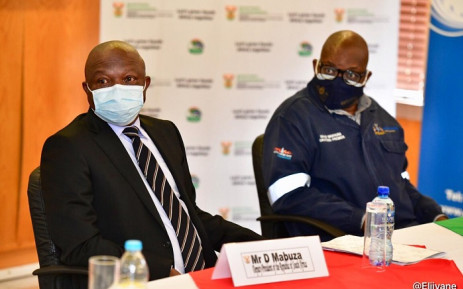Made up of Sebokeng, Vanderbjilpark, Vereeniging and Sharpeville, residents continue to live on delayed on-going sewage problem that has become a norm for years’.
This prompted the deputy president David Mabuza, premier of Gauteng David Makhura, minister of human-settlement Lindiwe Sisulu, and other officials, to pay visit the troubled municipality on Tuesday, to observe the extend of the sewage problem and other non-delivery services.
The raw sewage has been flowing into the popular tourist attraction Vaal River and into municipal pumps for years’ now, resulting in the stench that has affected tourists and communities.
Because of the stench and non-service deliveries some businesses had to close shop including hotels and restaurants.
Dep Pres Mabuza visited the Sebokeng Waste Water Treatment Facility, to witness the progress thus far, a contaminated area that is the cause of the problem.
Deputy President David Mabuza has apologised to residents of Sebokeng for government’s delayed reaction to the ongoing raw sewage problem in the Emfuleni Municipality.
Mabuza was joined by Human Settlements Minister Lindiwe Sisulu and some Gauteng MECs on a site visit to the contaminated area on Tuesday to assess the progress at the Sebokeng Waste Water Treatment Facility.
“We want to apologise for the time we have taken to deal with the problem,” he said.
Last year, Mabuza visited the area after a South African National Defence Force project dedicated to addressing the problem stalled when R350 million earmarked for the work ran out.
And it seems there has not been much change since the deputy president’s visit last year with residents vowing to stay away from this year’s local government elections.
Tshidiso Motaung (45) from Evaton says they were promised to fix the waste facility but it seems all was a lie.
“It’s disheartening when our own people lie to us on service delivery yet when elections approach, they know which buttons to press. We will show them this time how it feels, we’re Gatvol with the governing party,” he said unapologetically.
The South African Human Rights Commission made several visits to the area and found that peoples’ rights were violated in the form of poor water waste facility that did not function and criticised Government for unaccountability.
Mabuza has made a promise the matter will be resolved soon and service delivery will be a priority in the Emfuleni Municipality.
Meanwhile, the City of Johannesburg has shown the poorest record of progress compared to other Gauteng metros in the provision of basic services to targeted poorer communities.
This is according to the SA Human Rights Commission (SAHRC) report on the state of human rights in the province, with special focus on the upgrading of informal settlements and the provision of critical services, including water, sanitation and electricity, as part of basic human rights.
The report focused on the first two quarters of the 2020/2021 financial year of the three metros, looking at the plans they had put in place and work they had actually done.
The national government created the upgrading of informal settlement programme (UISP) which is budgeted and funded through 20% of the urban settlement development grant (USDG) and in which metros are required to prioritise upgrading informal settlements and the living standards of poor communities.
SAHRC officer Dalli Weyers said Johannesburg had received R370m from the government for the UISP projects, with its biggest being the formalisation of informal settlements, which was allocated R221m.
Weyers said despite its elaborate plan, the city has performed very poorly in implementing its projects, which also included electrification and implementation of water and sanitation.
“By the end of the second quarter, a mere 11% of the budget linked to these projects had been spent. The reason for concern is that between the end of the first and the end of the second quarter, only 1% of the budget had been spent.
“So it is 10% in the first quarter and only 1% in the second quarter. Obviously, if the city continues on this trajectory, these projects will not be implemented by the end of the financial year,” he said.
Weyers said between one in five and one in six households in the three metros lived in informal settlements, 18% in Ekurhuleni, 19% in Johannesburg and 16.4% in Tshwane.
Just over 20% of households were without electricity in Ekurhuleni, 29% in Johannesburg while Tshwane was at 15.1%, according to the SAHRC, which also placed households who used shared water taps and sanitation at 8.1%, 72% and 3.1% in Ekurhuleni, Johannesburg and Tshwane respectively.
For the 2020/2021 financial year, Ekurhuleni had received R394m for UISP, of which R220m was dedicated to electrification.
Weyers said while there was poor communication and public participation, the implementation of its projects stood at 44.5% at the end of second quarter.
“That is not a bad percentage. Halfway through the financial year and you are almost getting to halfway through the implementation of the projects that you had identified, and we have appreciation that Covid-19 likely had implication for some of these projects,” he said.
Weyers said the SAHRC appreciated that Tshwane had for some time been placed under administration, which made the current administration battle to provide the commission with adequate information for the current financial year.
Image (Dep Pres David Mabuza and Gauteng Premier David Makhura at the Sebokeng Water Waste facility on Tuesday).

